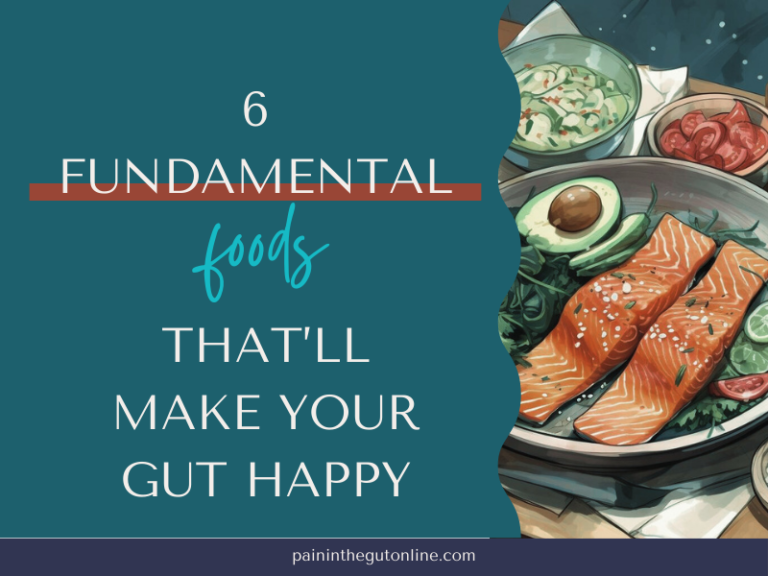GUT HEALTH AND CHRONIC INFLAMMATION
9 min read/ 1,924 words
Combat chronic inflammation with gut health! Discover the key to reclaiming your health and reducing inflammation naturally.

Table of Contents
Gut Health and Inflammation
Understanding the connection between gut health and inflammation is essential for reclaiming your overall health. The gut microbiome, a complex community of microorganisms in your digestive system, plays a critical role in maintaining gut health and influencing the body’s inflammatory response.
Let’s explore the gut microbiome overview and the role of probiotics and synbiotics in promoting a healthy gut.
Gut Microbiome Overview
The gut microbiome is a collection of trillions of microorganisms, including bacteria, viruses, fungi, and other microbes, that reside in your gastrointestinal tract. These microorganisms form a highly diverse ecosystem that interacts with the gut epithelium and the immune system, contributing to intestinal homeostasis.
Research suggests that alterations in the gut microbiome are linked to various diseases, including inflammatory bowel disease (IBD).
Maintaining a healthy gut microbiome is crucial for a well-functioning digestive system and overall well-being. A diverse and balanced gut microbiome is associated with a reduced risk of autoimmune diseases and other inflammatory conditions (source).
Role of Probiotics and Synbiotics
Probiotics and synbiotics are beneficial substances that can impact gut health and inflammation.
Probiotics are live microorganisms, such as certain strains of bacteria or yeast, that confer health benefits when consumed in adequate amounts. Synbiotics, on the other hand, are a combination of probiotics and prebiotics, which are specialized fibers that serve as food for the beneficial bacteria in your gut.
Probiotics and synbiotics have gained attention for their potential to modulate the immune system and support an anti-inflammatory response. In animal studies and randomized clinical trials, they have been shown to reduce the expression of pro-inflammatory cytokines and improve clinical symptoms (source).
Consuming probiotics and synbiotics can help restore the balance of beneficial bacteria in your gut, promoting a healthy gut microbiome and potentially reducing chronic inflammation.
Probiotics can be found in fermented foods like yogurt, kefir, sauerkraut, and kimchi. Probiotic supplements are available in various forms, including capsules, powders, and liquids.
It’s important to note that the effectiveness of probiotics and synbiotics may vary depending on the specific strains and formulations. Consulting with a healthcare professional or registered dietitian can help you choose the most suitable probiotic or synbiotic for your needs.
It’s crucial to adopt an anti-inflammatory diet to further support gut health and combat chronic inflammation.
This diet focuses on consuming foods that have been shown to have anti-inflammatory effects, such as fruits, vegetables, whole grains, healthy fats, and lean proteins. By incorporating these anti-inflammatory foods into your diet, you can help reduce inflammation in the body and promote a healthy gut.
By understanding the importance of the gut microbiome and incorporating probiotics, synbiotics, and an anti-inflammatory diet into your lifestyle, you can take significant steps towards improving gut health and combating chronic inflammation. Prioritizing your gut health can have far-reaching benefits, positively impacting both your physical and emotional well-being.
Impact of Diet on Gut Health
Your diet plays a significant role in maintaining a healthy gut and managing chronic inflammation.
What you eat can shape the structure, composition, and function of your gut microbiome, which interacts with the gut epithelium and mucosal immune system to maintain intestinal homeostasis. Making mindful food choices can help support a healthy gut and reduce the risk of chronic inflammation.
Foods Affecting Gut Microbiome
Certain foods can have a direct impact on the health of your gut microbiome.
A diet high in processed foods and added sugars can decrease the amount of “good” bacteria and diversity in your gut (Healthline). On the other hand, incorporating foods known for their positive effects on gut microbiota can promote a healthier gut environment.
Here are some examples of foods that can affect your gut microbiome:
| Food | Impact on Gut Microbiome |
|---|---|
| Fermented dairy products (e.g., yogurt, buttermilk) | Linked to anti-inflammatory bacteria such as Bifidobacterium, Lactobacillus, and Enterococcus sp. (Medical News Today) |
| Red wine | Associated with beneficial short-chain fatty acid bacteria that support gut health (Medical News Today) |
| Legumes, vegetables, fruits, nuts | Long-term consumption may help prevent intestinal inflammatory processes through the gut microbiome (Medical News Today) |
These are just a few examples, and incorporating a diverse range of whole, unprocessed foods into your diet is generally beneficial for gut health. For more information on how diet influences gut bacteria and inflammation, check out our article on an anti-inflammatory diet for gut health.
Anti-Inflammatory Foods
Chronic inflammation has been linked to major diseases such as cancer, heart disease, diabetes, arthritis, depression, and Alzheimer’s. Including anti-inflammatory foods in your diet can help reduce inflammation and support overall health.
Here are some examples of anti-inflammatory foods:
- Fatty fish, such as salmon, mackerel, and sardines, which are rich in omega-3 fatty acids.
- Fruits and vegetables, especially those high in antioxidants and phytochemicals.
- Nuts and seeds, such as walnuts, almonds, and flaxseeds, which provide healthy fats and antioxidants.
- Whole grains, like oats and brown rice, which contain fiber and important nutrients.
- Healthy oils, such as olive oil, avocado oil, and coconut oil.
Following an overall healthy diet, such as the Mediterranean diet, which emphasizes fruits, vegetables, whole grains, fish, and healthy oils, can help reduce levels of inflammation and improve physical and emotional health (Harvard Health Publishing).
For more information on specific anti-inflammatory foods, refer to our article on anti-inflammatory foods for gut health.
By being mindful of the foods you consume and incorporating anti-inflammatory choices into your diet, you can support your gut health and mitigate chronic inflammation. Remember, it’s important to maintain a balanced and varied diet to provide your body with the nutrients it needs for optimal gut function.
Gut Health Indicators
Maintaining a healthy gut is essential for overall well-being, as it plays a significant role in various bodily functions, including immune response, hormone balance, and inflammation regulation. By understanding the indicators of poor gut health, you can take steps to improve your gut health and combat chronic inflammation.
Signs of Poor Gut Health
Poor gut health can manifest in various ways, and recognizing these signs can help you identify potential issues and take appropriate action. Some common signs of poor gut health include:
- Fatigue: Feeling constantly tired, even after getting enough rest, can be a sign of an unhealthy gut. Fatigue may occur due to nutrient deficiencies caused by poor absorption in the gut.
- Upset Stomach: Frequent digestive issues like bloating, gas, constipation, or diarrhea indicate an imbalance in the gut microbiome. These symptoms may be a result of inflammation or an overgrowth of harmful bacteria.
- Skin Conditions: Skin conditions such as acne, eczema, or rosacea can be linked to gut health. Inflammation in the gut can contribute to inflammation in the skin, leading to the development or worsening of these conditions.
- Autoimmune Challenges: An unhealthy gut can lead to an immune system that is out of balance. This imbalance can trigger autoimmune diseases, where the body’s immune system mistakenly attacks its own tissues.
Incorporating probiotics, fermented foods, maintaining hydration, managing stress, and adopting a balanced diet can improve gut health and address these indicators. To learn more about these strategies, check out our article on gut health.
Effects of Chronic Inflammation
Chronic inflammation is a persistent state of inflammation in the body linked to numerous chronic diseases.
It can contribute to the development or progression of conditions such as cancer, heart disease, diabetes, arthritis, depression, and Alzheimer’s (Harvard Health Publishing). Understanding the effects of chronic inflammation can motivate you to prioritize your gut health.
Inflammation plays a complex role in the body.
While acute inflammation is a natural response to injury or infection and helps in the healing process, chronic inflammation can be detrimental. Prolonged inflammation can damage healthy tissues and organs, disrupt normal physiological functions, and contribute to the development of diseases.
In the context of gut health, an unhealthy gut can increase systemic inflammation and alter the proper functioning of the immune system. This dysregulation of the immune system can lead to autoimmune diseases, where the body’s immune system mistakenly attacks its own tissues (Healthline).
Chronic inflammation has been linked to specific proteins that promote tumor progression, certain types of cancer, type 2 diabetes, and cardiovascular diseases.
Taking steps to improve gut health can help reduce chronic inflammation.
By adopting an anti-inflammatory diet that includes foods with anti-inflammatory properties, such as fruits, vegetables, whole grains, fatty fish, and healthy oils, you can support your gut health and minimize inflammation. To learn more about specific anti-inflammatory foods, refer to our article on anti-inflammatory foods for gut health.
By paying attention to the indicators of poor gut health and understanding the effects of chronic inflammation, you can take proactive measures to prioritize your gut health and reduce inflammation. Incorporating healthy lifestyle choices, including a balanced diet, regular exercise, stress management, and proper hydration, can contribute to a healthier gut and overall well-being.
Lifestyle Factors and Gut Health
To combat chronic inflammation and promote a healthy gut, it’s essential to consider the influence of your lifestyle choices, particularly your diet and the use of supplements.
Understanding the connection between gut health and overall well-being is crucial.
Influence of Diet and Supplements
What you eat plays a significant role in shaping the structure, composition, and function of the gut microbiome. The gut microbiome interacts with the gut epithelium and mucosal immune system, maintaining intestinal homeostasis in a healthy state.
A diet rich in anti-inflammatory foods can help support gut health and combat chronic inflammation.
Research indicates that having a diverse range of bacteria in the gut can help reduce the risk of conditions like autoimmune diseases. To promote a healthy gut, incorporate probiotics and synbiotics into your diet. These beneficial microorganisms have been shown to modulate the immune system and reduce inflammation (source).
Avoiding or limiting processed foods and added sugars is crucial for maintaining gut health.
These foods can decrease the amount of “good” bacteria and diversity in the gut, leading to inflammation throughout the body. Instead, focus on consuming a diet high in fruits, vegetables, whole grains, lean proteins, and healthy fats.
Supplements can also play a role in supporting gut health.
Probiotic supplements can help restore a healthy balance of gut bacteria, especially after a round of antibiotics or during times of digestive distress. However, choosing high-quality supplements and consulting with a healthcare professional before starting any new regimen is important.
Gut Microbiome and Overall Health
Maintaining a healthy gut microbiome is not only important for gut health but also for overall well-being. An unhealthy gut can manifest as fatigue, upset stomach, skin conditions, and even autoimmune challenges (Healthline).
On the other hand, a healthy gut contributes to proper nutrient absorption, regulation of blood sugar levels, and overall immune system function.
Chronic inflammation, often resulting from an imbalanced gut, has been linked to major diseases such as cancer, heart disease, diabetes, arthritis, depression, and Alzheimer’s.
By prioritizing your gut health through a nutritious diet, regular exercise, stress management, and adequate sleep, you can help reduce systemic inflammation and promote better long-term health.
Understanding the impact of lifestyle factors on gut health empowers you to make choices that support a healthy gut and combat chronic inflammation. By adopting a balanced diet, incorporating gut-friendly supplements, and maintaining a healthy lifestyle, you can take proactive steps towards reclaiming your health and promoting overall well-being.
Grab our FREE Beginner’s Guide to Gut Health to learn more about your gut health, and grab a list of 60 anti-inflammatory foods you can easily add to your weekly meal plan.






